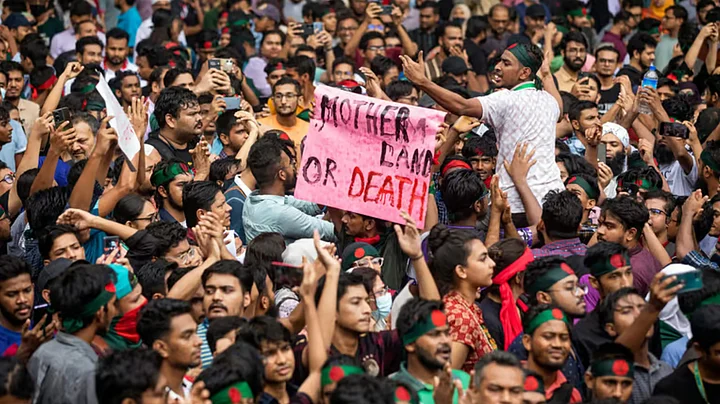As Bangladesh teeters on the edge with enraged students restarting their protests which have already claimed too many lives – the official toll is 150 but 266 have been killed according to media reports and human rights bodies monitoring the unrest – there are key lessons for India.
First and foremost, the storming of the headquarters of the state broadcaster, Bangladesh Television (BTV), by demonstrators in the heart of Dhaka in broad daylight, should be an eye-opener for the 'Godi media' in our country which prides itself in being the government’s lapdog but hasn’t faced reprisals yet for being unethical and unprincipled.
Angered by BTV’s one-sided pro-government coverage of the anti-quota protests, the agitators set fire to the BTV building, trapping many inside it and vandalising vehicles parked outside.
The attack on BTV was the direct outcome of its sickening coverage, reminiscent of the utter lack of objectivity and neutrality of many TV channels in India during farmers’, anti-CAA and other mass movements.
While I certainly do not endorse the violence, our electronic media should instantly take heed of the warning signals from the country burning next door.
Secondly, as the root cause of the massive protests in the neighbouring nation is the lack of jobs due to the discriminatory policies of the Sheikh Hasina government, India too should brace itself for protests by our own youth grappling with skyrocketing joblessness for which the Narendra Modi government, now in its third straight term, can’t shirk responsibility.
How fragile and dangerous the situation is in India was demonstrated this month itself by the mayhem and lawlessness at Mumbai airport when 25,000 unemployed youth turned up for a walk-in interview announced by Air India Airport Services to recruit 600 loaders. The stampede in the financial capital was preceded by the life-threatening chaos in Gujarat’s Ankleshwar when hundreds of jobseekers arrived to fill up 10 vacancies in a private firm. A railing collapsed in the melee but fortunately, there was no loss of life.
Undeniably, Indian youths are so desperate for jobs that they are willing to risk their lives in Russia and Israel. Notably, protests erupted in Delhi's Old Rajinder Nagar after three UPSC aspirants drowned to death after their coaching centre was flooded due to heavy rains.
If the Modi government doesn’t rectify the situation by generating jobs it keeps promising the youth, a repetition in India of the unemployed battling security forces in Bangladesh and paying with their lives, can’t be ruled out. The rampage in Uttar Pradesh and Bihar in the wake of the introduction of the Agniveer model is too recent to be brushed under the carpet and pretend that all’s fine.
Thirdly, as the situation in Bangladesh will inevitably worsen in the coming days because of Hasina’s authoritarianism and reliance on brute force instead of treating protestors as her citizens and winning them over with trust, New Delhi must choose its words with great care.
So far, External Affairs Minister S Jaishankar, junior minister Kirti Vardhan Singh, and External Affairs Ministry spokesman Randhir Jaiswal have underlined with utmost caution and discretion that whatever is happening next door is Dhaka’s internal matter. Harsh Vardhan Shringla, who was our High Commissioner in Dhaka and rose to become the Foreign Secretary, too spoke very responsibly and constructively to the media.
In contrast, another retired diplomat, Pinak Ranjan Chakravarty, who also served as our High Commissioner in Bangladesh, has said in a signed piece on students’ protests that “unverified reports suggest that Shibir (Islami Chattra Shibir is the students' wing of the Jamaat-e-Islami party) cadres have attacked hostels housing Hindu students.”
As the reports are unverified by Chakravarty’s own admission, why give them any credence by even referring to them? Any attempt to give a Hindu-Muslim colour to a popular uprising in Bangladesh can have disastrous effects on our side.
Fourthly and finally, now that everyone in our country knows that over 8,500 Indians are enrolled in medical colleges in Bangladesh to become doctors and roughly 1,000 have temporarily returned home because of the current upheaval but will return to their campuses as soon as possible, we should stop speaking disdainfully and disrespectfully of Bangladesh as a poor and backward country exporting terrorists and refugees to India.
The unrest across the border has presented us with an opportunity to publicly thank our neighbour for imparting quality medical education to thousands of Indian youth which will eventually strengthen our creaking health infrastructure.
Jayshree, who is a practising Vaishnav and doesn’t eat onion and garlic, has told the Free Press Journal that she chose Dhaka National Medical College after trying out similar institutions in Russia and Kazakhstan. Even more importantly, she put on record her profound gratitude to the principal of the medical college in Dhaka for arranging what she calls “personalised food service” to meet her religious requirements in an alien land.
Let's give the Bangladeshi principle a big hand; I think we owe the country a big ‘thank you’ even it struggles to come to terms with its internal conflicts. The Hasina regime’s incredibly highhanded response to peaceful protests has already set the country back by $10 billion. Unfortunately, the cost of the stuttering economy is going to climb as there are no signs of the agitation dying down which is not good news for the entire neighbourhood, especially India.
(SNM Abdi is a distinguished journalist and ex-Deputy Editor of Outlook. This is an opinion article and the views expressed are the author’s own. The Quint neither endorses nor is responsible for them.)
(At The Quint, we question everything. Play an active role in shaping our journalism by becoming a member today.)
